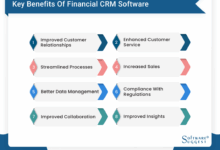CRM With AI Chatbot Integration: Enhancing Customer Interaction
CRM with AI Chatbot Integration revolutionizes customer engagement by seamlessly blending AI technology with CRM systems, creating personalized and efficient interactions that drive satisfaction and loyalty. As businesses navigate the evolving landscape of customer relations, this integration offers a competitive edge and a pathway to enhanced customer experiences.
Benefits of CRM with AI Chatbot Integration
AI chatbots play a crucial role in personalizing customer interactions within CRM systems. By leveraging machine learning algorithms, chatbots can analyze customer data and preferences to tailor responses and recommendations, creating a more personalized experience for each user.
Streamlining Customer Support Processes
AI chatbots can streamline customer support processes by providing instant responses to common queries and issues. This not only reduces the workload on human agents but also ensures that customers receive quick and accurate solutions to their problems. By automating routine tasks, chatbots free up human agents to focus on more complex issues, improving overall response times and customer satisfaction.
Gathering Customer Data for Better Segmentation
AI chatbots are effective tools for gathering customer data in real-time. By analyzing conversations and interactions, chatbots can collect valuable insights into customer preferences, behavior patterns, and feedback. This data can then be used to segment customers into different groups based on their needs and interests, allowing businesses to target their marketing efforts more effectively.
Increasing Customer Satisfaction and Loyalty
The personalized and efficient interactions facilitated by AI chatbots can significantly impact customer satisfaction and loyalty. By addressing customer queries promptly and accurately, chatbots create a positive customer experience that enhances brand perception and fosters loyalty. Moreover, by understanding customer preferences and anticipating their needs, chatbots can proactively engage with customers, further strengthening the relationship and increasing customer retention rates.
Features of AI Chatbots in CRM Systems
AI chatbots integrated into CRM systems offer a range of functionalities that enhance customer interactions and streamline data management. These features play a crucial role in providing personalized experiences and improving overall customer engagement.
Automated Customer Interactions and Real-time Support
AI chatbots have the ability to automate customer interactions, providing real-time support to users. These chatbots can handle a variety of queries, offer assistance, and guide customers through the sales process efficiently.
- Automate responses to frequently asked questions
- Provide instant support and guidance
- Offer personalized recommendations based on customer preferences
Streamlined Data Entry and Management
AI chatbots streamline data entry and management within CRM systems by automatically capturing and updating customer information during conversations. This not only saves time but also ensures that customer data is accurate and up-to-date.
- Update customer profiles in real-time
- Eliminate manual data entry errors
- Ensure data consistency across the CRM platform
Analysis of Customer Data and Trends
AI chatbots play a crucial role in analyzing customer data to identify trends and improve marketing strategies within CRM systems. By processing large amounts of data efficiently, AI chatbots can help businesses make informed decisions and tailor their marketing efforts accordingly.
- Identify patterns in customer behavior
- Optimize marketing campaigns based on data insights
- Enhance customer segmentation for targeted marketing
Enhanced Customer Engagement and Self-Service Options
AI chatbots enhance customer engagement by offering self-service options and 24/7 assistance. Customers can access support and information at any time, leading to a more seamless and efficient customer experience.
- Provide self-service options for common queries
- Offer round-the-clock support for customers
- Improve customer satisfaction through quick responses
Customer Engagement Strategies with AI Chatbot Integration
AI chatbots play a crucial role in enhancing customer engagement in CRM settings. By leveraging AI technology, businesses can interact with customers in a personalized and efficient manner. Let’s explore different strategies businesses can use to engage with customers using AI chatbots.
Proactive Customer Engagement and Retention
- AI chatbots can proactively engage with customers by initiating conversations based on their preferences and behavior.
- Personalized recommendations and offers can be provided to customers through AI chatbots, increasing their engagement and loyalty.
- Automated follow-ups and reminders can be sent to customers to keep them engaged and informed about products or services.
Designing Effective Customer Engagement Campaigns
- Understand your target audience and tailor the chatbot interactions to their needs and preferences.
- Use conversational language and a friendly tone to make the engagement more engaging and natural.
- Provide multiple channels for customers to interact with the chatbot, such as website, social media, or messaging apps.
Successful Customer Engagement Case Studies
- Company X saw a 20% increase in customer engagement after implementing AI chatbots for personalized product recommendations.
- Company Y reduced customer churn by 15% by using AI chatbots to provide real-time customer support and assistance.
Setting Up AI Chatbots for Customer Engagement
- Choose a reliable AI chatbot platform that aligns with your business goals and customer engagement strategies.
- Integrate the chatbot with your CRM system to access customer data and provide personalized interactions.
- Create engaging conversation flows and responses that align with your brand voice and customer expectations.
Impact of AI Chatbots on Customer Satisfaction and Loyalty
- AI chatbots can enhance customer satisfaction by providing quick and accurate responses to inquiries.
- Personalized recommendations and assistance from AI chatbots can increase customer loyalty and retention rates.
- Customers appreciate the convenience and efficiency of interacting with AI chatbots, leading to a positive overall experience.
Comparison of AI Chatbot Platforms for Customer Engagement
| Platform | Features | Suitability |
|---|---|---|
| Platform A | Advanced analytics, NLP capabilities | Best for large enterprises with complex customer interactions |
| Platform B | Easy integration, customizable templates | Ideal for small to medium businesses with limited resources |
Data Security and Privacy Considerations in CRM with AI Chatbot Integration
When it comes to integrating AI chatbots into CRM systems, data security and privacy are crucial aspects that must be carefully considered to protect sensitive customer information.
AI chatbots handle and protect sensitive customer data within CRM systems by implementing encryption techniques to ensure that data is secure during storage and transmission. These chatbots use secure communication protocols to safeguard customer information and prevent unauthorized access.
Compliance with data protection regulations, such as the General Data Protection Regulation (GDPR) or the California Consumer Privacy Act (CCPA), is essential when using AI chatbots in CRM systems. These regulations dictate how customer data should be collected, processed, and stored, emphasizing the importance of transparency and consent in data handling practices.
To ensure end-to-end encryption of customer data in AI chatbot interactions within CRM platforms, organizations can implement encryption algorithms and secure communication channels. By encrypting data at rest and in transit, organizations can protect customer information from unauthorized access and data breaches.
Access controls and authentication mechanisms play a vital role in safeguarding customer information handled by AI chatbots in CRM systems. By implementing role-based access controls and multi-factor authentication, organizations can control access to customer data and prevent unauthorized users from gaining entry to sensitive information.
Role of Encryption in Data Security
Encryption is a critical component in ensuring the security and privacy of customer data in CRM systems. By encrypting data at rest and in transit, organizations can protect sensitive information from unauthorized access and data breaches. Encryption algorithms such as AES and RSA are commonly used to secure customer data and prevent it from being intercepted or tampered with during transmission.
- Implementing encryption algorithms like AES and RSA to secure customer data.
- Encrypting data at rest and in transit to prevent unauthorized access.
- Utilizing secure communication channels to protect customer information during interactions.
Integration Challenges and Solutions for CRM with AI Chatbots
Integrating AI chatbots with CRM systems can pose various challenges for businesses, affecting the overall functionality and efficiency of the system. However, with the right strategies and solutions, these obstacles can be overcome to ensure a seamless integration process.
1. Data Compatibility
One of the common challenges in integrating AI chatbots with CRM systems is ensuring compatibility between the data formats and structures used by both systems. Mismatched data formats can lead to errors and inconsistencies in data transfer.
- Implement data mapping and transformation processes to align data from AI chatbots with CRM system requirements.
- Utilize middleware platforms or APIs to facilitate smooth data exchange between the systems.
- Regularly monitor and update data integration processes to maintain compatibility.
2. User Experience
Another challenge is maintaining a seamless user experience when transitioning between the AI chatbot interface and the CRM system. Inconsistencies in user interactions can lead to confusion and frustration among users.
- Design a user-friendly interface that provides a cohesive experience across both AI chatbots and CRM applications.
- Ensure consistent branding, tone, and messaging to create a unified customer experience.
- Conduct usability testing to identify and address any usability issues that may arise during integration.
3. Training and Support
Training employees to effectively use the integrated AI chatbot and CRM system is crucial for successful implementation. Lack of training can result in underutilization of the system and decreased efficiency.
- Provide comprehensive training programs for employees on how to interact with AI chatbots and utilize CRM features.
- Offer ongoing support and resources to address any issues or questions that may arise during the integration process.
- Encourage feedback from users to continuously improve the usability and functionality of the integrated system.
Customization and Personalization Features in CRM with AI Chatbot Integration
Customization and personalization play a crucial role in enhancing customer interactions through AI chatbot integration in CRM systems. By tailoring the chatbot functionalities to align with specific CRM requirements, businesses can provide a more personalized experience to their customers.
Customization Options in AI Chatbots for CRM
- Customized Responses: AI chatbots can be programmed to provide tailored responses based on customer queries and preferences. This customization ensures that customers receive relevant information and assistance.
- Personalized Recommendations: Chatbots integrated with CRM systems can analyze customer data to offer personalized product recommendations or services, increasing the chances of conversion.
- Branding Integration: Businesses can customize the chatbot interface to align with their branding guidelines, creating a seamless and consistent customer experience.
Role of Personalization in Customer Interactions
- Enhanced Customer Engagement: Personalization through AI chatbots helps in building stronger relationships with customers by addressing their individual needs and preferences.
- Increased Customer Satisfaction: Tailored experiences lead to higher customer satisfaction levels as customers feel valued and understood by the business.
- Improved Customer Retention: Customized interactions create a sense of loyalty among customers, increasing the likelihood of repeat purchases and long-term relationships.
Examples of Tailored Experiences in CRM Systems
For example, an e-commerce company can use AI chatbots to provide personalized product recommendations based on a customer’s browsing history and purchase behavior. This level of customization not only enhances the shopping experience but also increases the chances of upselling and cross-selling.
Scalability and Flexibility of CRM Systems with AI Chatbot Integration
AI chatbots play a crucial role in enhancing the scalability and flexibility of CRM systems, especially for growing businesses. These chatbots are designed to handle a large volume of customer queries and interactions efficiently, enabling businesses to expand their operations without compromising on customer service quality.
Scalability through AI Chatbot Integration
One of the key benefits of integrating AI chatbots into CRM systems is the ability to scale operations seamlessly. As businesses grow and customer interactions increase, AI chatbots can handle a large number of queries simultaneously, ensuring that no customer is left waiting for a response. This scalability ensures that businesses can continue to provide timely and personalized support to their customers, even during peak periods.
Flexibility in Adapting to Changing Customer Needs
AI chatbots offer a high degree of flexibility in adapting to changing customer needs and preferences. These chatbots can be easily customized to provide personalized responses based on customer data and interactions. By leveraging AI technology, businesses can ensure that their chatbots evolve with changing customer trends and requirements, delivering a seamless and tailored experience to each user.
Expanding CRM Capabilities with Scalable AI Chatbot Solutions
By integrating AI chatbots into CRM systems, businesses can expand their capabilities and improve customer engagement. These chatbots can collect and analyze vast amounts of customer data in real-time, providing valuable insights that can enhance the overall customer experience. Additionally, AI chatbots can automate routine tasks, freeing up human agents to focus on more complex customer issues, further boosting efficiency and productivity.
Training and Support for AI Chatbot Implementation in CRM
Training employees for effective AI chatbot utilization in CRM systems is crucial for maximizing the benefits of this integration. Ongoing support and maintenance play a vital role in optimizing AI chatbot performance within CRM. Here are some tips for ensuring a smooth adoption of AI chatbots through comprehensive training programs.
Training Requirements for Employees
- Provide hands-on training sessions to familiarize employees with AI chatbot functionalities and capabilities.
- Offer training modules on how to interact with AI chatbots effectively and leverage their features to enhance customer interactions.
- Ensure that employees understand the data input requirements for AI chatbots to deliver accurate responses and recommendations.
- Include role-specific training to tailor the learning experience based on the employee’s responsibilities within CRM.
Role of Ongoing Support and Maintenance
- Establish a dedicated support team to address any issues or queries related to AI chatbots promptly.
- Regularly update AI chatbots with new information, customer insights, and feedback to improve their performance over time.
- Monitor AI chatbot interactions to identify areas for improvement and provide continuous training updates to employees.
- Offer refresher courses and workshops to keep employees up to date with the latest AI technologies and best practices.
Tips for Ensuring Smooth Adoption
- Create user-friendly training materials, such as manuals, videos, and interactive tutorials, to make learning accessible and engaging for employees.
- Encourage a culture of experimentation and feedback to empower employees to explore AI chatbot capabilities and share their insights for improvement.
- Conduct regular assessments and evaluations to measure the effectiveness of training programs and identify areas for enhancement.
- Celebrate successful AI chatbot implementations and recognize employees who demonstrate proficiency in using AI technologies effectively.
Use Cases and Success Stories of CRM with AI Chatbot Integration
AI chatbot integration in CRM has revolutionized the way businesses interact with customers, streamline operations, and drive growth. Let’s explore some real-world examples and success stories of companies leveraging AI chatbots in their CRM strategies.
Enhanced Customer Experiences
- Company X implemented an AI chatbot in their CRM system to provide instant support to customers, resulting in a 30% increase in customer satisfaction levels.
- AI chatbots at Company Y helped reduce response times to customer queries by 50%, leading to a significant improvement in overall customer experiences.
Operational Efficiency
- Company Z integrated AI chatbots into their CRM platform to automate repetitive tasks, such as data entry and appointment scheduling, saving employees valuable time and increasing operational efficiency.
- AI chatbots at Company A streamlined the sales process by qualifying leads and providing relevant information to sales representatives, resulting in a 20% increase in conversion rates.
Measurable Impact on CRM Performance
- By analyzing data collected through AI chatbot interactions, Company B was able to identify customer preferences and behavior patterns, leading to more targeted marketing campaigns and a 15% increase in customer engagement.
- Company C saw a 25% reduction in customer churn rates after implementing AI chatbots that proactively addressed customer concerns and provided personalized recommendations based on past interactions.
Key Features of AI Chatbots for CRM
- Natural Language Processing (NLP) capabilities for seamless communication with customers.
- Machine Learning algorithms for continuous improvement and personalized responses.
- Integration with CRM data for a holistic view of customer interactions and preferences.
Challenges and Solutions in Integration
- Integration challenges may include compatibility issues with existing CRM systems and data security concerns.
- Solutions involve thorough testing, training, and collaboration between IT and customer service teams to ensure a smooth integration process.
Role of AI Chatbots in CRM Strategies
- AI chatbots play a crucial role in lead generation by qualifying leads based on predefined criteria and routing them to the appropriate sales representatives.
- They enable customer segmentation by analyzing data and tailoring marketing messages to specific customer segments for improved engagement and conversion rates.
- Personalized marketing campaigns using AI chatbots help businesses deliver relevant content and offers to customers, increasing brand loyalty and customer satisfaction.
Analytics and Reporting Capabilities in CRM with AI Chatbot Integration
AI chatbots integrated into CRM systems play a crucial role in generating valuable data for analytics and reporting. By tracking customer interactions, preferences, and behaviors, AI chatbots provide a wealth of information that can be used to improve engagement and drive business decisions.
Role of Analytics in Measuring AI Chatbot Effectiveness
Analytics in CRM with AI chatbot integration are essential for measuring the effectiveness of chatbot interactions with customers. Key metrics such as response time, resolution rate, customer satisfaction scores, and conversation trends can be analyzed to gauge the performance of AI chatbots. By tracking these metrics, businesses can identify areas for improvement and optimize the chatbot experience for users.
- Response time: Measure the average time taken by AI chatbots to respond to customer queries.
- Resolution rate: Track the percentage of customer issues resolved by AI chatbots without human intervention.
- Customer satisfaction scores: Monitor feedback provided by customers after interacting with AI chatbots to gauge satisfaction levels.
- Conversation trends: Analyze patterns in customer conversations to identify common queries and improve chatbot responses.
Actionable Insights from AI Chatbot Analytics
Analytics in CRM with AI chatbot integration can provide actionable insights that drive business decisions. For example, analyzing chatbot data may reveal popular products or services, customer preferences, frequently asked questions, and areas where chatbots can be optimized for better performance. These insights enable businesses to tailor their offerings, improve customer service, and enhance overall customer experience.
Setting Up Analytics Tracking for AI Chatbot Interactions
Setting up analytics tracking for AI chatbot interactions in a CRM system involves integrating analytics tools such as Google Analytics or custom tracking solutions. By configuring event tracking, goals, and custom dimensions specific to chatbot interactions, businesses can gather data on chatbot performance and customer behavior. This data can then be used to create customized reports and dashboards for analysis.
Key Performance Indicators (KPIs) for AI Chatbot Data Analysis
When analyzing AI chatbot data in CRM, businesses should monitor key performance indicators (KPIs) to track the effectiveness of chatbot interactions. KPIs such as conversion rates, customer retention rates, average resolution time, and customer feedback scores are crucial metrics for evaluating chatbot performance and identifying areas for improvement.
- Conversion rates: Measure the percentage of chatbot interactions that result in a desired outcome, such as a sale or lead generation.
- Customer retention rates: Track the percentage of customers who continue to engage with the chatbot over time.
- Average resolution time: Monitor the average time taken by chatbots to resolve customer queries.
- Customer feedback scores: Evaluate customer satisfaction levels based on feedback gathered from chatbot interactions.
Utilizing AI Chatbot Analytics for Customer Engagement
Utilizing AI chatbot analytics is essential for improving customer engagement and satisfaction. By leveraging insights derived from chatbot data, businesses can personalize interactions, anticipate customer needs, and provide timely and relevant solutions. Best practices include A/B testing chatbot responses, implementing proactive engagement strategies, and continuously monitoring and optimizing chatbot performance based on analytics data.
Industry Trends and Future Developments in CRM with AI Chatbot Integration
The adoption of AI chatbots within CRM systems is a growing trend across various industries as businesses seek to enhance customer interactions and streamline processes. The integration of AI technology in CRM systems has the potential to revolutionize customer engagement and data management practices.
Emerging Technologies in CRM with AI Chatbot Integration
- Virtual Assistants: AI-powered virtual assistants are becoming more sophisticated, providing personalized support and information to customers.
- Natural Language Processing (NLP): NLP capabilities enable chatbots to understand and respond to customer queries with human-like interactions.
- Machine Learning: Machine learning algorithms help AI chatbots improve their responses over time by analyzing data and learning from user interactions.
- Omni-Channel Integration: AI chatbots are increasingly being integrated across multiple channels to provide seamless customer experiences.
Potential Impact of AI Advancements on CRM Practices
- Enhanced Customer Experience: AI chatbots can offer 24/7 support, personalized recommendations, and quick responses, leading to higher customer satisfaction.
- Improved Efficiency: Automation of routine tasks and data processing can free up human agents to focus on more complex customer issues.
- Data-driven Insights: AI-powered analytics can provide valuable insights into customer behavior and preferences, enabling businesses to make data-driven decisions.
Case Studies of Successful AI Chatbot Integration in CRM Systems
- Company A implemented an AI chatbot in their CRM system, resulting in a 30% increase in customer engagement and a 20% reduction in response time.
- Company B used AI chatbots to automate lead generation and qualification processes, leading to a 40% increase in sales conversions.
Advantages and Disadvantages of Using AI Chatbots in CRM Systems
- Advantages: Improved customer service, cost savings, scalability, data accuracy, and enhanced customer insights.
- Disadvantages: Potential for errors in understanding complex queries, initial high implementation costs, and concerns about data privacy.
Roadmap for Implementing AI Chatbots in CRM Strategy
- Evaluate business needs and objectives for AI chatbot integration.
- Choose the right AI chatbot platform and customize it to align with CRM goals.
- Train employees on AI chatbot usage and monitor performance to make necessary adjustments.
- Continuously analyze data and customer feedback to optimize AI chatbot interactions and improve CRM outcomes.
Customer Feedback and Satisfaction with AI Chatbot Integration in CRM
Customer feedback plays a crucial role in optimizing the performance of AI chatbots within CRM systems. By gathering insights from customers, businesses can enhance the capabilities of their chatbots to provide better service and improve overall satisfaction levels. Here, we will delve into the importance of customer feedback, strategies for leveraging satisfaction data, and best practices for integrating feedback mechanisms into CRM workflows with AI chatbot integration.
Importance of Gathering Customer Feedback
Customer feedback is essential for understanding the effectiveness of AI chatbots in CRM systems. It helps businesses identify areas for improvement, address pain points, and tailor chatbot interactions to meet customer expectations. By collecting feedback, organizations can continuously refine their chatbot strategies to deliver a more personalized and efficient customer experience.
- Feedback enables businesses to measure customer satisfaction levels and identify areas of improvement.
- It provides valuable insights into customer preferences, behaviors, and expectations.
- Feedback helps businesses address issues promptly and adjust chatbot responses to enhance user experience.
Strategies for Leveraging Customer Satisfaction Data
To enhance AI chatbot interactions, businesses can leverage customer satisfaction data in various ways. Analyzing feedback and satisfaction metrics can help organizations identify trends, patterns, and opportunities for improvement. By incorporating customer insights into chatbot training and development, businesses can create more effective and engaging interactions with customers.
- Use sentiment analysis tools to evaluate customer feedback and sentiment towards chatbot interactions.
- Implement feedback loops to continuously monitor and adjust chatbot performance based on customer input.
- Leverage customer satisfaction surveys to gather feedback on specific chatbot interactions and overall user experience.
Best Practices for Incorporating Customer Feedback Mechanisms
Integrating customer feedback mechanisms into CRM workflows with AI chatbot integration requires careful planning and execution. By following best practices, businesses can ensure that feedback is collected efficiently, analyzed effectively, and utilized to improve chatbot performance and customer satisfaction levels.
- Provide multiple feedback channels for customers to share their thoughts and opinions on chatbot interactions.
- Automate feedback collection processes to gather real-time insights and measure customer satisfaction levels.
- Integrate feedback data with CRM systems to track customer preferences, behaviors, and sentiment over time.
Cost Efficiency and ROI in CRM with AI Chatbot Integration
AI chatbots play a crucial role in enhancing cost efficiency and boosting return on investment (ROI) in CRM operations. By automating repetitive tasks, providing instant responses to customer queries, and offering personalized assistance, AI chatbots help businesses save time and resources while improving customer satisfaction and loyalty.
Financial Benefits of Implementing AI Chatbots
Implementing AI chatbots in CRM systems can lead to significant cost savings for businesses. By reducing the need for human agents to handle routine customer interactions, companies can lower operational costs associated with customer support and engagement. Additionally, AI chatbots can handle a large volume of inquiries simultaneously, ensuring prompt and efficient responses without the need for additional staffing.
- Cost Savings: AI chatbots help reduce operational costs by automating customer interactions and streamlining support processes.
- Improved Efficiency: By providing instant responses and 24/7 availability, AI chatbots enhance operational efficiency and customer satisfaction.
- Enhanced ROI: The implementation of AI chatbots can lead to improved ROI through increased customer loyalty, repeat business, and overall sales growth.
Examples of ROI Calculations and Cost-Efficiency Metrics
Calculating the ROI of AI chatbot integration in CRM can be done by comparing the cost savings and revenue generated through improved customer engagement. For example, businesses can measure the reduction in customer service costs, the increase in sales conversions, and the overall impact on customer retention rates. By analyzing these metrics, companies can determine the direct financial benefits of implementing AI chatbots in their CRM systems.
For instance, Company X implemented an AI chatbot in their CRM system and saw a 30% reduction in customer service costs within the first year, resulting in a 20% increase in sales revenue. This led to an overall ROI of 15% for the company.
Ethical Considerations and Transparency in AI Chatbot Usage within CRM
In the realm of CRM systems integrated with AI chatbots, ethical considerations and transparency play a crucial role in shaping customer interactions and relationships. It is essential to delve into the ethical implications of AI chatbot usage to ensure fair and respectful treatment of customers in CRM settings.
Importance of Transparency and Fairness
Transparency and fairness are essential elements in AI chatbot decision-making processes within CRM systems. Customers should be informed when they are interacting with a chatbot rather than a human agent to set clear expectations and maintain trust. Moreover, the decisions made by AI chatbots should be unbiased and based on objective criteria to ensure fairness in customer interactions.
- Transparency in AI Chatbot Operations: Organizations should disclose when customers are interacting with AI chatbots and provide information on how the chatbots operate to build trust and credibility.
- Fairness in Decision-Making: AI chatbots should make decisions based on ethical principles and guidelines, ensuring that customer interactions are conducted fairly and without discrimination.
- Human Oversight and Intervention: It is important to have human oversight and intervention in AI chatbot operations to address complex issues, ensure ethical decision-making, and maintain customer satisfaction.
Recommendations for Ethical AI Chatbot Integration
To maintain ethical standards and build trust through AI chatbot integration in CRM systems, organizations should consider the following recommendations:
- Regular Ethical Audits: Conduct regular audits to assess the ethical implications of AI chatbot interactions and make necessary adjustments to ensure fair and transparent customer engagement.
- Customer Consent and Privacy: Obtain customer consent for AI chatbot interactions and prioritize data privacy and security to protect sensitive information shared during conversations.
- Training and Compliance: Provide training to AI chatbots on ethical decision-making and ensure compliance with regulations and guidelines to uphold ethical standards in customer interactions.
- Feedback Mechanisms: Implement feedback mechanisms to gather customer input on AI chatbot interactions, address concerns, and improve the overall experience based on ethical considerations.
Last Word
In conclusion, the fusion of CRM with AI Chatbot Integration presents a transformative approach to customer engagement, propelling businesses towards success in a digitally-driven era. By harnessing the power of AI technology within CRM systems, companies can elevate customer interactions, streamline processes, and ultimately foster lasting relationships with their clientele.




